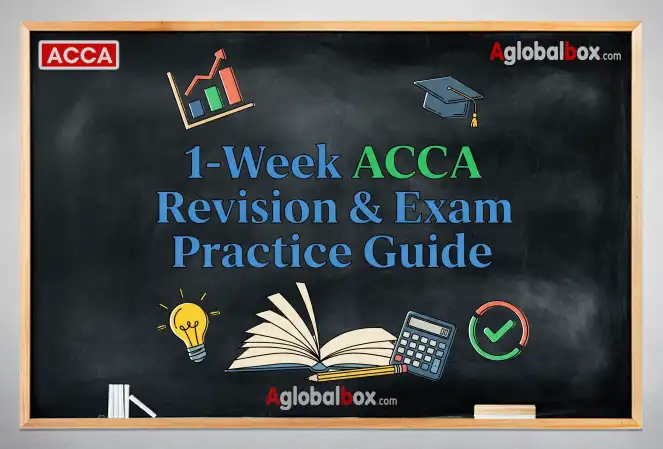Are you searching for comprehensive and reliable study materials to excel in your ACCA Business and Technology exam? The F1 Workbook Business and Technology – BT from Kaplan provides the essential foundation you need to master this critical ACCA qualification. This comprehensive guide explores everything about the BT module, from understanding its core concepts to developing an effective study strategy using Kaplan’s proven materials.
Overview of ACCA Business and Technology (BT) Module
| Aspect | Details |
|---|---|
| Module Code | F1/BT (Business and Technology) |
| Level | Applied Knowledge |
| Exam Format | Computer-based, On-demand |
| Duration | 2 hours |
| Question Types | Section A: 46 objective questions (30 two-mark, 16 one-mark)<br>Section B: 6 multi-task questions (4 marks each) |
| Pass Mark | 50% |
| Prerequisites | None |
What is the ACCA Business and Technology (BT) Module?
The ACCA Business and Technology (BT) module serves as your gateway to understanding how businesses operate in today’s complex commercial environment. This qualification teaches you how businesses operate effectively, efficiently and ethically while highlighting the critical role finance professionals play in achieving organizational success.
The BT module covers six main areas that form the backbone of modern business operations. You will explore business organization structures, accounting systems, managing human resources, leadership dynamics, governance frameworks, and ethical considerations. Each section builds upon the previous one, creating a comprehensive understanding of business fundamentals.
Core Learning Objectives
The module focuses on developing your understanding of business in context, including economic, legal, and regulatory influences. You will learn about governance structures, employment law, health and safety requirements, data protection protocols, and security measures that modern businesses must navigate.
Key competencies you will develop include analyzing business environments, evaluating organizational structures, understanding financial systems, and applying ethical principles to business decisions. These skills form the foundation for advanced ACCA qualifications and professional accounting practice.
How Difficult is the F1 Workbook Business and Technology Module to Study and Pass?
The BT module is generally considered one of the more accessible ACCA papers, making it an ideal starting point for your ACCA journey. Most students find the content logical and straightforward, particularly if you approach it with proper preparation and quality study materials.
Difficulty Assessment
Moderate difficulty level characterizes the BT exam, with success rates typically ranging between 60-75%. The module requires solid understanding rather than complex calculations, making it more about comprehension and application than advanced technical skills. Students with business background often find the concepts familiar, while those new to business studies may need additional time to grasp fundamental principles.
The objective question format in Section A tests your knowledge across all syllabus areas, requiring broad understanding rather than deep specialization in specific topics. Section B’s multi-task questions demand practical application of concepts, which many students find more challenging than pure recall.
Common Study Challenges
Many students struggle with the breadth of topics covered rather than their individual complexity. Time management during the exam proves challenging, as you must answer 52 questions in 120 minutes. The integrated nature of business concepts means understanding how different areas connect becomes crucial for success.
Ethical considerations and governance topics often present difficulties, as they require understanding subtle distinctions and applying principles to practical scenarios. Students sometimes underestimate the preparation time needed, assuming the module’s introductory nature means minimal study effort.
Why Choose Kaplan for Your BT Studies?
Kaplan stands as one of the most recognized and trusted publishers of ACCA study materials globally. Their F1 Workbook Business and Technology materials have helped thousands of students achieve ACCA success through proven teaching methodologies and comprehensive content coverage.
Kaplan’s Educational Excellence
Industry expertise sets Kaplan apart from other providers. Their materials are developed by qualified ACCA members and experienced educators who understand both the syllabus requirements and practical business applications. This ensures your study materials remain current with industry trends and examination standards.
Kaplan’s materials feature clear explanations, practical examples, and structured learning paths that guide you from basic concepts to advanced applications. Their integrated approach connects theoretical knowledge with real-world business scenarios, preparing you for both examinations and professional practice.
Quality Assurance Standards
Every Kaplan publication undergoes rigorous quality control processes, ensuring accuracy, clarity, and alignment with ACCA requirements. Their materials are regularly updated to reflect syllabus changes, regulatory updates, and evolving business practices.
Student feedback integration means Kaplan continuously improves their materials based on user experiences and examination trends. This responsive approach ensures you receive the most effective study tools available in the market.
Advantages of Using PDF Workbooks for BT Studies
PDF workbooks offer numerous advantages for modern ACCA students, particularly those balancing studies with work commitments or seeking flexible learning solutions.
Accessibility and Convenience
24/7 availability means you can access your study materials anywhere, anytime, without carrying heavy textbooks. Whether you’re commuting, traveling, or studying late at night, your PDF materials remain instantly accessible on any device.
Digital formats allow for searchable content, enabling quick location of specific topics, definitions, or examples. This feature proves invaluable during revision periods when you need to quickly reference particular concepts or regulations.
Enhanced Study Features
PDF materials support interactive learning through hyperlinked contents, bookmarks, and annotation capabilities. You can highlight important passages, add personal notes, and create customized study guides that reflect your learning preferences and progress.
Cost effectiveness represents another significant advantage, as PDF materials typically cost less than printed versions while offering identical content quality. You also avoid shipping costs and delivery delays that might affect your study schedule.
Environmental and Practical Benefits
Digital materials support sustainable learning by reducing paper consumption and transportation requirements. You can print specific sections when needed while maintaining the complete digital library for reference purposes.
Version control becomes simpler with PDF materials, as updates and corrections can be distributed instantly, ensuring you always have the most current information available.
How to Plan Your BT Study Schedule
Effective planning forms the foundation of successful ACCA preparation. A well-structured study schedule ensures comprehensive coverage of all syllabus areas while allowing sufficient time for revision and practice.
Creating Your Study Timeline
12-week preparation period is typically recommended for the BT module, allowing adequate time for initial learning, practice, and revision. This timeframe assumes 10-15 hours of weekly study, which most working professionals can accommodate alongside their commitments.
Break down the six main syllabus areas into manageable weekly segments. Allocate more time to areas you find challenging while ensuring balanced coverage across all topics. Include buffer time for unexpected delays or additional practice needs.
Weekly Study Structure
Design each week with consistent daily sessions rather than irregular marathon study periods. Short, focused sessions prove more effective for retention and understanding than lengthy, unfocused attempts.
Monday to Wednesday should focus on new content learning, using your Kaplan workbook to understand concepts, work through examples, and complete chapter exercises. Thursday and Friday can be dedicated to review and practice questions, reinforcing your understanding through application.
Weekend sessions work well for comprehensive review, mock examinations, and addressing areas of weakness identified during the week. This structure maintains momentum while preventing burnout.
Milestone Planning
Set monthly objectives that align with your overall preparation timeline. Month one should focus on understanding business organization and accounting systems. Month two covers human resources and leadership concepts. Month three addresses governance, ethics, and comprehensive review.
Weekly assessments help track your progress and identify areas requiring additional attention. Use Kaplan’s self-assessment tools and practice questions to gauge your understanding and readiness.
How to Effectively Prepare for the ACCA BT Exam
Effective preparation requires a systematic approach that combines thorough content understanding with strategic examination techniques.
Mastering the Syllabus Content
Active reading of your Kaplan workbook ensures deep understanding rather than passive absorption. Take notes, create mind maps, and summarize key points in your own words. This approach helps internalize concepts and improves retention.
Work through all examples and exercises provided in your materials. These practical applications reinforce theoretical knowledge and demonstrate how concepts apply in business scenarios. Don’t skip sections that seem easy – they often contain subtle details important for examination success.
Practice Question Strategy
Regular practice with objective questions helps develop the speed and accuracy needed for Section A. Kaplan materials include extensive question banks that mirror actual examination standards and difficulty levels.
For Section B preparation, focus on multi-task questions that require integrated thinking across different syllabus areas. These questions test your ability to apply knowledge in complex scenarios, reflecting real business challenges.
Memory and Retention Techniques
Spaced repetition proves highly effective for retaining the broad range of information covered in BT. Review previous topics regularly while learning new material to maintain knowledge currency.
Create personal summaries and acronyms for complex frameworks and processes. Visual learners benefit from diagrams and flowcharts that illustrate relationships between different business concepts.
Mock Examination Practice
Complete timed mock examinations under examination conditions to build confidence and identify areas needing improvement. Kaplan provides realistic mock papers that simulate the actual examination experience.
Analysis of performance after each mock examination helps target revision efforts effectively. Focus additional study time on areas where you lost marks rather than reinforcing topics you already understand well.
Last-Minute Preparation Guide for BT Success
The final weeks before your examination require focused revision and strategic preparation to maximize your performance potential.
Final Review Strategy
Systematic revision of all syllabus areas ensures no topics are forgotten during the pressure of final preparation. Use your Kaplan materials’ summary sections and quick reference guides for efficient review.
Focus on high-impact areas that frequently appear in examinations. Governance frameworks, ethical principles, and business organization structures typically feature prominently in BT papers.
Examination Day Preparation
Technical preparation includes familiarizing yourself with the computer-based testing format if you haven’t experienced it before. Practice navigating between questions and using available tools efficiently.
Time management skills become crucial for examination success. Allocate approximately 1.5 minutes per Section A question and 6 minutes per Section B question, leaving time for review and checking.
Key Areas for Final Focus
Ethics and governance topics require particular attention, as they often involve subjective judgment and application of principles to scenarios. Review case studies and practical examples to prepare for these applications.
Business organization structures and their characteristics should be thoroughly understood, including advantages, disadvantages, and appropriate applications for different scenarios.
Confidence Building Activities
Positive visualization and relaxation techniques help manage examination anxiety and maintain focus during the test. Regular practice with timed conditions builds confidence in your ability to complete the examination successfully.
Final knowledge checks using quick-reference cards or summary sheets reinforce key facts and formulas that might be needed during the examination.
Understanding the BT Examination Format and Strategy
The BT examination consists of two sections: Section A contains 30 two-mark objective questions and 16 one-mark objective questions, while Section B contains 6 four-mark multi-task questions examining the six main syllabus sections.
Section A Strategy
Systematic approach works best for Section A questions. Read each question carefully, eliminate obviously incorrect answers, and select the best available option. Don’t spend excessive time on any single question – maintain steady progress throughout this section.
Question types include multiple choice, multiple response, and fill-in-the-blank formats. Each requires slightly different approaches, so practice with varied question styles improves your adaptability during the actual examination.
Section B Approach
Integrated thinking becomes essential for Section B success. These questions often combine elements from different syllabus areas, requiring comprehensive understanding rather than isolated topic knowledge.
Practical application skills are tested through scenario-based questions that mirror real business situations. Your Kaplan materials prepare you for these applications through case studies and practical examples.
Key Study Resources and Materials
Beyond your primary Kaplan workbook, additional resources can enhance your preparation and provide varied perspectives on examination topics.
Essential Kaplan Materials
Study Text provides comprehensive coverage of all syllabus areas with detailed explanations, examples, and progress checks. This forms your primary learning resource throughout your preparation period.
Exam Kit contains extensive practice questions, mock examinations, and detailed answer explanations. Regular use of this material develops examination technique and identifies areas needing additional attention.
Pocket Notes offer convenient revision tools for quick reference and final preparation activities. These condensed summaries prove valuable for maintaining knowledge currency and examination day reference.
Supplementary Learning Resources
ACCA official materials including past papers, examiner reports, and technical articles provide insights into examination trends and common student mistakes to avoid.
Online resources from reputable providers offer additional practice questions, video explanations, and interactive learning tools that complement your Kaplan materials effectively.
Tips for Maximizing Your Success Rate
Success in the BT examination requires more than just knowledge – strategic preparation and smart study techniques significantly impact your results.
Effective Study Habits
Consistent daily practice proves more effective than irregular intensive study sessions. Maintain momentum through regular engagement with your materials rather than cramming before deadlines.
Active engagement with content through note-taking, summarizing, and teaching concepts to others deepens understanding and improves retention rates significantly.
Common Pitfalls to Avoid
Underestimating preparation time leads many students to rush through topics without adequate understanding. Allow sufficient time for learning, practice, and revision activities.
Neglecting practice questions results in poor examination technique despite strong theoretical knowledge. Regular question practice develops speed, accuracy, and confidence.
Building Confidence
Regular self-assessment through practice tests and knowledge checks helps identify strengths and weaknesses early in your preparation process. This allows targeted improvement efforts where needed most.
Realistic expectations about learning curves and progress rates prevent discouragement during challenging study periods. Most students require multiple exposures to complex topics before achieving mastery.
Creating Effective Study Notes from Your Kaplan Materials
Transforming your Kaplan workbook content into personalized study notes enhances learning effectiveness and creates valuable revision resources.
Note-Taking Strategies
Structured approach using headings, subheadings, and bullet points creates easily navigable notes that support efficient review. Mirror the organization of your Kaplan materials while adding personal insights and connections.
Visual elements including diagrams, charts, and mind maps help illustrate relationships between concepts and improve recall during examinations. Many business concepts benefit from visual representation.
Personalization Techniques
Individual learning style adaptation ensures your notes match how you best process and retain information. Visual learners benefit from colors and diagrams, while auditory learners might include recorded summaries.
Real-world connections linking theoretical concepts to current business examples or personal experiences strengthens understanding and makes abstract concepts more memorable and applicable.
Key Takeaways
- F1 Workbook Business and Technology – BT provides essential foundation knowledge for ACCA success and professional accounting practice
- Kaplan materials offer proven quality, comprehensive coverage, and practical examination preparation resources
- Systematic study planning with consistent daily practice and regular assessment maximizes learning effectiveness
- PDF workbooks provide flexible, accessible, and cost-effective study solutions for modern learners
- Integrated preparation strategy combining content mastery with examination technique development ensures optimal results
- Regular practice with objective and multi-task questions builds confidence and develops required examination skills
Frequently Asked Questions (FAQ)
Q: How long should I study for the BT examination? A: Most students require 8-12 weeks of consistent preparation, studying 10-15 hours weekly. This allows adequate time for learning, practice, and revision activities.
Q: Can I pass BT using only Kaplan materials? A: Yes, Kaplan’s comprehensive workbook and exam kit provide all necessary resources for BT success. Many students achieve excellent results using exclusively Kaplan materials.
Q: Is the BT examination difficult for beginners? A: BT is designed as an introductory module and is generally considered accessible for students new to business studies. Proper preparation using quality materials like Kaplan ensures good success prospects.
Q: How important are ethics questions in the BT exam? A: Ethics and governance form a significant portion of the syllabus and frequently appear in examinations. These topics require thorough understanding and practical application skills.
Q: Can I take BT as my first ACCA examination? A: Yes, BT has no prerequisites and serves as an excellent introduction to ACCA qualifications. Many students begin their ACCA journey with this module.
Q: How often can I attempt the BT examination? A: BT is an on-demand examination, allowing flexible scheduling. You can attempt it whenever you feel adequately prepared, subject to examination center availability.
Q: What calculator can I use in the BT exam? A: The examination center provides an on-screen calculator. However, BT primarily focuses on business concepts rather than complex calculations.
Q: Are there any specific industry knowledge requirements for BT? A: No specific industry experience is required. The module covers general business principles applicable across all sectors and industries.
Conclusion
The F1 Workbook Business and Technology – BT from Kaplan represents your gateway to ACCA success and professional accounting excellence. This comprehensive guide has explored every aspect of the BT module, from understanding its fundamental concepts to developing winning examination strategies.
Your journey to ACCA qualification begins with quality preparation using proven materials and systematic study approaches. Kaplan’s workbook provides the foundation, expertise, and practical tools needed to master business and technology concepts while developing essential professional skills.
Success in the BT examination opens doors to advanced ACCA qualifications and rewarding accounting careers. Start your preparation today with confidence, knowing you have access to the resources and strategies that have helped thousands of students achieve their ACCA goals.






